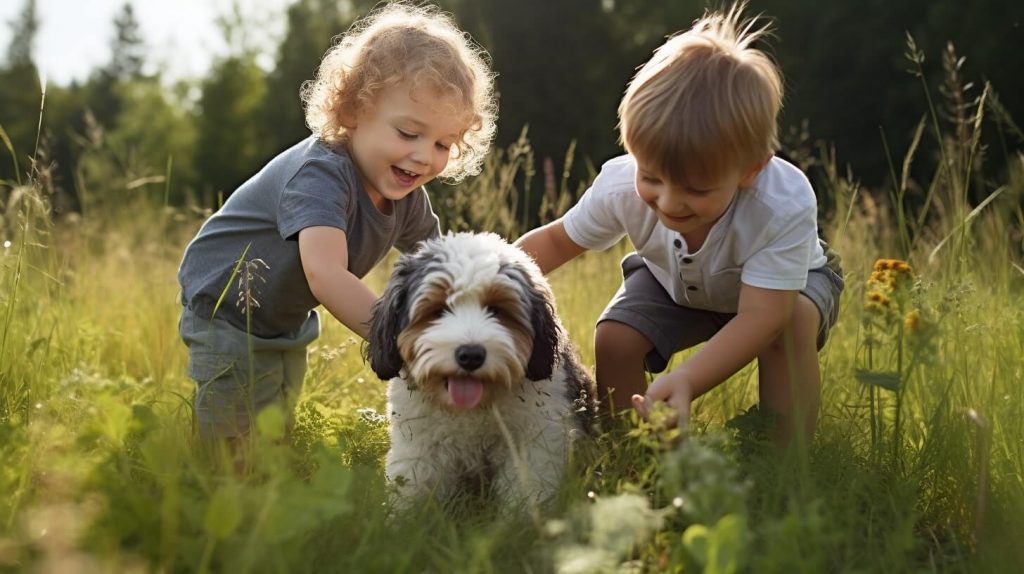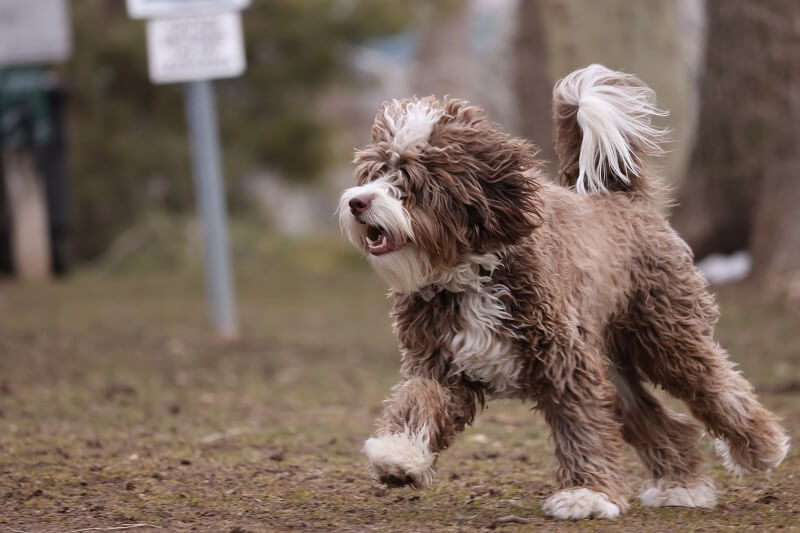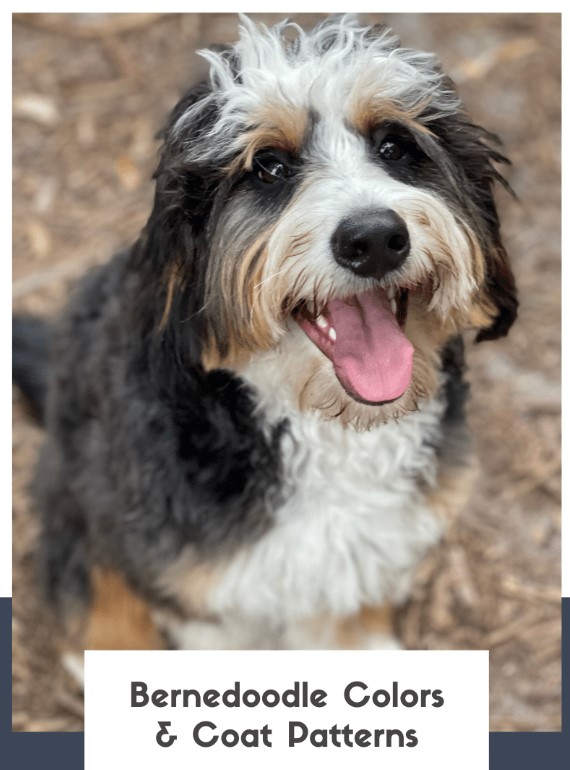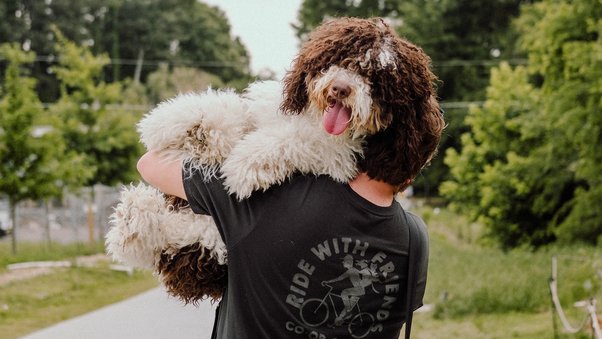
The Bernedoodle, a mix of Bernese Mountain Dog and Poodle, is known for its intelligence and trainability. This hybrid breed, which emerged in 2003, along with its smaller version, the Mini Bernedoodle, has gained immense popularity, with some becoming social media sensations. These dogs are really clever, thanks to their Poodle genes, and they’re super loyal, just like their Bernese Mountain Dog ancestors. They love learning new tricks and spending time with people.
Bernedoodles have special coats that usually don’t shed much, which can vary depending on factors like generation and genetics. They come in different colors, like black, white, and rust, which look a lot like the Bernese Mountain Dog’s markings.
If you’re thinking about getting a Bernedoodle, it’s a good idea to check out rescue organizations or shelters first. But if you’re set on getting a puppy, make sure you find a breeder who really cares about the dogs. Ensure they prioritize the health and temperament of their dogs, does health checks, and creates a loving environment for the puppies. This approach guarantees a healthy and happy pup while discouraging unethical breeding practices.
Origin
Bernedoodles originated in the United States around 2003.
Breed Group
They belong to the hybrid (Designer) breed group.
Size
Standard Bernedoodles: 50 to 90 pounds
Miniature Bernedoodles: 25 to 50 pounds
Tiny Bernedoodles: 10 to 25 pounds
Lifespan Bernedoodles typically live between 12 and 15 years.
Coat
They usually have wavy or curly coats that are low-shedding, making them suitable for allergy sufferers.
Temperament
Bernedoodles are recognized for their affectionate, intelligent, and sociable nature, often serving as therapy dogs.
Exercise Needs
They require moderate exercise, including regular walks, playtime, and mental stimulation.
Training
Bernedoodles are intelligent and trainable, responding well to positive reinforcement methods.
Grooming
The grooming requirements may differ depending on the type of coat. Curlier coats may need more attention to avoid matting. It’s advisable to brush regularly and consider occasional professional grooming.
Health Like any mixed breed, Bernedoodles may inherit health issues from both parent breeds, including conditions common to Bernese Mountain Dogs and Poodles. Regular veterinary care is important for their health and well-being.

The Bernedoodle is a friendly companion dog known for its intelligence and charming temperament, a blend of its Poodle and Bernese Mountain Dog parents. They thrive in the company of their families, enjoying playtime and cuddles with children and adults alike. While it’s hard to predict their traits precisely due to their recent emergence, they often display a mix of Poodle and Bernese characteristics.
Bernedoodle enthusiasts appreciate their friendly nature, intelligence, and hypoallergenic qualities. They come in various coat types and colors, with three size options: tiny, miniature, and standard, depending on the size of the Poodle parent. Bernedoodles adapt well to different living situations, with smaller ones suitable for apartments and larger ones benefiting from spacious yards.
Their moderate exercise needs typically include daily walks, and they’re known for their good health and entertaining antics. Whether you’re seeking a family pet or a loyal companion, the Bernedoodle is an excellent choice that’s sure to bring joy to your home.

The Bernedoodle is a newer breed, with Sherry Rupke of Swissridge Kennels often credited as the first intentional breeder to combine Poodles and Bernese Mountain Dogs to create the Bernedoodle in 2003. However, there may have been accidental mixes of these breeds before then.
Although not recognized by the American Kennel Club, the Bernedoodle is acknowledged by several other organizations, including the American Canine Hybrid Club, the Designer Dogs Kennel Club, the International Designer Canine Registry, and the Designer Breed Registry.
While Bernedoodles are considered designer breeds, they can still be found in shelters and rescue groups that specialize in Poodles and Bernese Mountain Dogs. Adoption from such organizations is encouraged over purchasing from breeders, emphasizing the importance of adopting before shopping for pets.

Bernedoodles come in three different sizes: tiny, miniature, and standard. This is determined by the size of the Poodle parent, which can be toy, mini, or standard size.
The Tiny Bernedoodle stands about 12 to 17 inches tall at the shoulder and weighs between 10 to 24 pounds. The Miniature Bernedoodle is slightly larger, standing at 18 to 22 inches tall and weighing 25 to 49 pounds. The Standard Bernedoodle is the largest, standing at 23 to 29 inches tall and weighing 70 to 90 pounds. Usually, male Bernedoodles are bigger than females.

Bernedoodles inherit great personality traits from their Bernese Mountain Dog and Poodle parents. However, which traits they get can vary, and each dog has its own unique personality. Generally, Bernedoodles are intelligent, loyal, and a bit silly.
They’re good with kids and other dogs if they’ve been properly socialized. Some Bernedoodles can be stubborn, especially when young, but they’re smart and learn quickly with training. Socialization is key, especially to help them feel comfortable around strangers.
Once Bernedoodles start their training, their smartness make it easier for them to learn commands compared to many other breeds. They might also take after the Bernese Mountain Dog’s wariness of strangers, so it’s crucial to socialize them well, especially when they’re young.
Bernedoodles are active and need regular exercise, but they also love attention and being with their families. Tiny and Miniature Bernedoodles adapt well to city life, while Standard Bernedoodles prefer more space to roam. A daily walk is essential to keep them happy and healthy. They enjoy both outdoor playtime and cozy cuddles on the couch with their humans.
Bernedoodles are usually robust dogs, but they can face some health issues, such as:
Hip Dysplasia: When the hip joint doesn’t fit properly, causing discomfort and difficulty in movement.
Elbow Dysplasia: Similar to hip dysplasia, but affecting the elbow joint.
Bloat: A severe condition where the stomach twists, cutting off blood supply.
Progressive Retinal Atrophy (PRA): An eye disease leading to blindness.
Hereditary Cataracts: Cloudy areas in the eye lens causing vision problems.
Demodex Mange: A skin problem caused by mites.
Von Willebrand’s Disease: A blood clotting disorder.
Inflammatory Bowel Disease (IBD): Chronic inflammation in the digestive tract.
Hypothyroidism: Insufficient hormone production by the thyroid gland. Regular vet checkups are vital to monitor your Bernedoodle’s health and catch any issues early. Being aware of the signs and symptoms of these health concerns enables prompt treatment when needed.

Ensuring the well-being of your Bernedoodle is essential. Here are some simple tips to help you maintain their health:
Nutritious Diet: Provide them with a balanced diet suitable for their age and energy needs.
Regular Exercise: Ensure they stay active with regular walks and playtime.
Maintain Healthy Weight: Monitor their weight to prevent fatness and related health issues.
Dental Care: Brush their teeth regularly to prevent dental problems.
Nail Care: Trim their nails as needed to avoid overgrowth and discomfort.
Routine Vet Visits: Schedule regular checkups with the vet to monitor their overall health. By following these guidelines, you can contribute to your Bernedoodle’s longevity and well-being.

Tiny and Miniature Bernedoodles are well-suited to apartment living, while Standard Bernedoodles enjoy having a yard to play in. Generally, they don’t need a lot of personal space and remain content as long as they receive enough physical and mental activity to keep them engaged.
Bernedoodles thrive on human companionship, so they prefer not to be left alone for extended periods. Like Poodles, they are intelligent and can easily pick up both good and bad habits. Consistent training is essential to guide their behavior. Early socialization with other dogs and people is beneficial and helps them behave well in new situations.

Determining the right amount of food for your Bernedoodle depends on factors like their size, age, and how active they are. Standard Bernedoodles can be big eaters, so it’s important to keep an eye on how much they eat and their weight. It’s a good idea to consult your vet for personalized dietary advice for your Bernedoodle.

Bernedoodles can have different types of coats, ranging from wavy to curly. This variety makes them less likely to shed, which is good news for people with allergies. However, some Bernedoodles might have straighter coats that shed more and are less hypoallergenic.
Their coat thickness helps them stay comfortable in cooler temperatures and protects them from the heat in summer. Bernedoodles come in various colors, including pure black, black and white, black and brown, and tri-colored combinations of black, white, and brown. Many people prefer Bernedoodles with tri-colored coats similar to Bernese Mountain Dogs. Curlier coats require more grooming to prevent matting, so daily brushing is often necessary. Some owners see grooming as a bonding activity and enjoy brushing their Bernedoodles regularly. Additionally, their coats need trimming every few months to keep them neat and tidy.

Bernedoodles are great companions for families with kids, but it’s crucial to teach children how to handle them gently, especially the smaller ones like Tiny and Miniature Bernedoodles, which can get hurt more easily.
They’re affectionate and enjoy playtime, especially with their families. Bernedoodles generally get along with other dogs, but early socialization is key to ensure they feel comfortable around new pets.

Choosing a trustworthy dog breeder is a big decision when getting a new dog. Reputable breeders focus on breeding healthy, friendly puppies. They check their breeding dogs for health issues, socialize the puppies early, and offer an ongoing support.
On the other side, backyard breeders prioritize profit over the well-being of the dogs. They might not check their dogs for health problems or socialize the puppies well. This can lead to health and behavior issues in the puppies.
